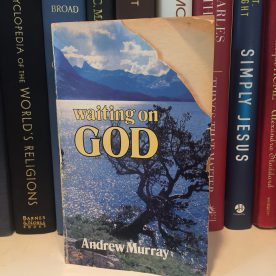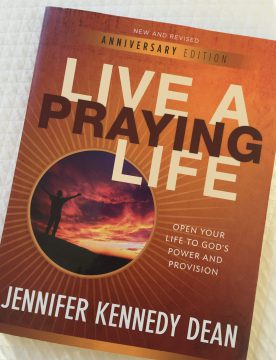I broke up with three pairs of perfectly good jeans recently, pants whose only offense was that they’d somehow gotten too small.
“It’s not you,” I sighed, gazing wistfully toward the giveaway pile (and wishing I could just blame the dryer). “It’s me.”
I don’t know when, exactly, everything in my closet started to shrink; maybe the heat from all the candles on my last birthday cake sparked some sort of climate change in our house? I do know, however, that I have never been so grateful for online tools like Biblehub.com, where you can look up Bible verses different translations.
Verses like Isaiah 61:3.
That’s the one where God promises to give us beauty for ashes, joy instead of mourning, and something called a “garment of praise” instead of despair. It’s an awesome verse in the NIV, but it gets even better in the good old King James. That’s where God says the garment of praise is for the “spirit of heaviness.”
Waaaait a minute. There’s a spirit of heaviness? Now you tell me…

Okay, okay. You know I’m kidding.
You have to admit, though. Isaiah 61:3 is a pretty great verse. Because whatever we’re carrying–be it a spiritual or a physical weight–God says he can lift it.
Redeem it.
Swap it out.
God promises to take the ashes of our dreams, the brokenness of our hearts, the shame of our past…and completely remake us. The last part of verse 3 says that we’ll be like great oaks that the Lord has planted for his own glory.
(Great oaks??? My mother once told me that I should be glad I had legs built like tree trunks, since it meant that I’d be able to stand for long periods of time. Maybe I should start claiming Isaiah 61:3 as my “life verse” and just own it?)
Anyhow.
While I was in the dressing room last week, trying to find a new pair of jeans (which is actually Part 2 of this post, and one I’ll hope you’ll read next week if you’ve ever questioned–or been frustrated by–the way that God wired your kids), I began to think about how life might be different if I woke up every day and, instead of thinking about actual clothing, I put on a garment of praise. What would happen if I took time to consciously consider God’s goodness, his power, and his love?
For starters, praise would take my focus off of the to-do lists of the day and make me aware of God’s presence (which is, as Psalm 16:11 reminds us, the Very Place where we find “fullness of joy”).
And then, as I meditated on God’s attributes–he’s our Provider, Protector, Redeemer, Counselor, Deliverer, Comforter, Friend–the problems and needs that clamored for space in my heart would start shrinking in size. It would work like what my friend Jennifer Kennedy Dean called “spiritual chemotherapy,” taking things like worry and fear–as well as those pesky, self-absorbed thoughts (“Do these pants make me look fat?”)–and targeting them for destruction.
That sounded like a win.
There was only one hitch.
What if I didn’t feel like adoring God, or thanking him, when I woke up? What if my first thought came with a sharp pain (or a dull ache) of remembrance, like in the weeks and months of waking up after God chose not to heal my father’s brain cancer? What if I questioned God’s goodness, or his wisdom, sometimes?
What then?
The answer, I think, it that it’s okay. God can handle our doubts and our questions. And if you take another look at Isaiah 61 (which is where the prophet tells us what the Messiah will do), the thing that stands out is that it’s not up to us. Jesus is the one who brings the comfort, the beauty, the joy. He’s the one who gives us the garment of praise. All we have to do is receive it!
I love how Isaiah wraps up the transformation, just a few verses later:
I delight greatly in the Lord;
my soul rejoices in my God.
For he has clothed me with garments of salvation
and arrayed me in a robe of his righteousness…
“I delight greatly in the Lord.”
Maybe just read that one out loud. It’s such a beautiful phrase…one we could look forward to wearing.
And on those days when our first thought is not one of delight–when our souls don’t readily rejoice in the Lord–let’s not beat ourselves up. Instead, let’s ask God for help. Let’s ask him to do the thing he does best: Get us dressed in garments that look and feel really good.
Heavenly Father,
Clothe me with beauty for ashes, the oil of joy instead of mourning, and a garment of praise instead of a spirit of despair. (Isaiah 61:3)
Amen
❤️
P.S. I can’t leave this post without pointing you toward two of my favorite “praise” resources.
The first is on Instagram. Type #adorationexplained into the search bar. You’ll meet Sara Hagerty (@sarahagertywrites), who tackles some of the thorniest questions we have when it comes to thanksgiving and praise, questions about the real struggles we face. “Adoration,” she says, “isn’t that we set aside our real interior life. It’s that we bring that to God. We bring our real honesty to God and we say, ‘Show up.'”
And the second help is this little devotional book by Jennifer Kennedy Dean, which is where I found that line about spiritual chemotherapy.

It’s called SEEK: 28 Days to Extraordinary Prayer. Jennifer went home to heaven about six weeks ago, and I’ve spent much of this summer moving between grief and gratitude as I re-read her incredible work. I know heaven is rejoicing, but golly. Jennifer: We’re gonna miss you down here. ❤️






















